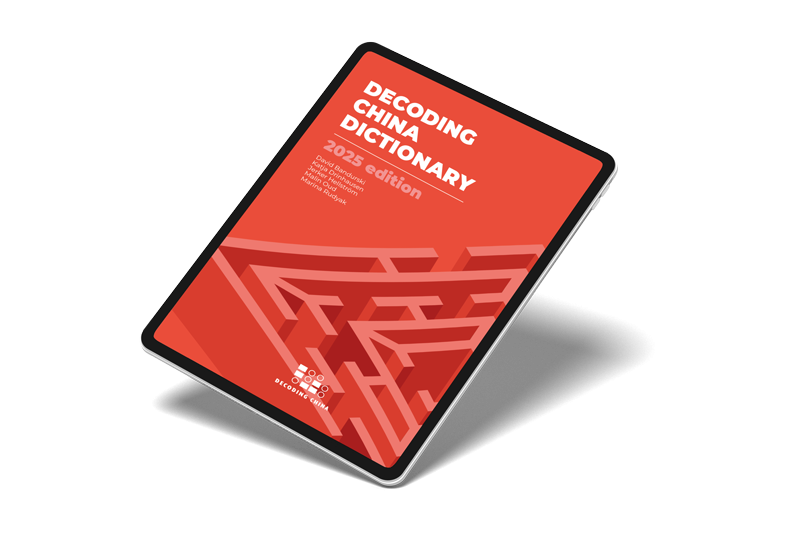
KEY TERM
International Relations
[ 国际关系 ]
[ 国际关系 ]
International Relations

In Chinese discourse, international relations conveys a normative vision of how states should interact, advocating a state-centric “democratisation” of global order over perceived Western interventionism and power politics.
Brief
In mainstream usage, “international relations” refers to the study and practice of political, economic, and security interactions among states and other global actors, including international organisations, corporations, and non-state groups. The UN Charter codifies key principles such as the sovereign equality of states, prohibition of force and commitment to peaceful dispute resolution, non-intervention, and respect for human rights.
In Chinese official discourse, “international relations” (国际关系) denotes not merely to the study or practice of relations, but a normative vision of how relations ought to be conducted. A “new type of international relations” (新型国际关系), characterised by mutual respect, fairness, justice and win-win cooperation” is a core concept within Xi Jinping Thought on Diplomacy. Framing itself as defender of the UN Charter, China calls for a “democratisation of international relations” (国际关系民主化), in opposition to what it depicts as Western interventionism undermining the sovereignty and interfering in the internal affairs of other countries under the banner of democracy and human rights.
Analysis
China’s “basic norms of international relations” (国际关系的基本准则) are officially rooted in the Five Principles of Peaceful Coexistence: mutual respect for sovereignty and territorial integrity, non-aggression, non-interference in internal affairs, equality and mutual benefit, and peaceful coexistence. Originally formulated in 1954, they were promoted during the Mao era as the foundation of modern international relations, countering what China saw as US-led “hegemonism” and “power politics”. From the outset, these principles served to defend China’s core interests: support for Taiwan independence or criticism over Tibet policy were framed as violating the basic norms of international relations, specifically the principle of non-interference.
The “new type of international relations” initially referred to ties within the socialist camp, especially with the USSR, defined by Leninist “proletarian internationalism” – promoted by China as a model relationship until the 1963 Sino-Soviet split reframed the USSR as a violator of international norms.
From the 1970s onward, China borrowed the Non-Aligned Movement’s rhetoric on the democratisation of international relations, linking sovereignty and opposition to “big power hegemonism” of the US and USSR with advocacy for greater agency for the Third World in global governance. The principle of “respect for sovereignty and territorial integrity” was regularly invoked to condemn U.S. interventions, such as in Libya and Iraq, and to oppose humanitarian interventions more broadly. In the 2000s, Hu Jintao elevated “jointly advancing the democratisation of international relations“ to a flagship slogan, but his state-centric reading equated democracy with equality among states rather than democracy within states.
This historical trajectory laid the groundwork for how under Xi Jinping, the CCP’s use of international relations embeds a dual counternarrative. First, a normative claim: China presents itself as a defender of basic norms – such as the Five Principles and the UN Charter – against what it labels as Western selective application, unilateral sanctions, and interventionism. Second, a strategic positioning: democratisation of international relations implies redistributing power toward developing countries and emerging powers without embracing liberal-democratic norms. This vision is explicitly state-centric, defining “interventionism” broadly to include external criticism, which is framed as a violation of sovereignty.
Though guoji guanxi is the standard Chinese term for international relations, guanxi – its second component – carries a culturally specific meaning that goes beyond neutral “relations”. Originating from Confucian thought, guanxi denotes a form of social capital embedded in reciprocal personal ties, where ongoing exchanges of favours generate durable networks of obligation, trust, and mutual recognition. Applied to the global sphere, international relations are fundamentally understood as human relations, with guanxi – the ability to manage them – constituting a key source of power.[1] Accordingly, ceremonial banquets and summit diplomacy – used to give face, reinforce status recognition, and create a network of reciprocal obligations – occupy a central place in China’s foreign policy.
The Chinese government expects international relations scholarship to serve national rejuvenation by producing theories with “Chinese characteristics” that embody China’s values, perspectives, and historical experience. It envisions the discipline as a tool to enhance China’s voice in global governance, promote its preferred norms, and support a multipolar, sovereignty-cantered international order. Under Xi, research funding has increasingly focused on his ideological concepts, with area studies elevated to a first-tier discipline, fostering scholarship with state priorities.
[1] Qin Yaqing, A Relational Theory of World Politics, Cambridge University Press, 2018.
How to cite this article:
Research related to this term was supported by:

Related Articles That Might Interest You


“The Cooperation Principle” – Wang Yi Receives Sweden’s Foreign Minister in Beijing





